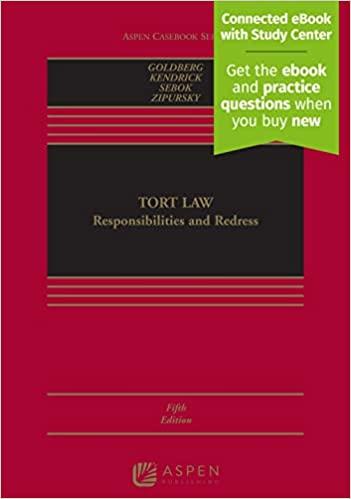Question
What Young Workers Should Know Please answer the following questions using the Guide to Employment Standards Act . 1. What is the purpose of the
What Young Workers Should Know Please answer the following questions using the Guide to Employment Standards Act .
1. What is the purpose of the Employment Standards Act (2000)?
2. List 5 individual, groups or organizations not covered by the act?
3. Indicate whether each of the following statements is true (T) or false (F).
a) _______ An employer is obligated to display an employment standards information poster in the workplace.
b) _______ An employer is not obligated to provide the information poster in any other language.
c) _______ An employee may request the information in another language.
d) _______ Young workers have the same rights as other workers though minimum wages differ. There are some exemptions and special conditions that apply to youth.
4. List 3 jobs that would be covered by the ESA.
5. Read the special rules under the section "Does the ESA cover young workers who are working on assignments through temporary help agencies?" What do you think is the purpose of each of the three special rules?
6. Define minimum wage.
7. True or False?
a) ______ Tips and gratuities are not considered wages.
b) ______ The number of hours worked is relevant to the determination of minimum wage.
c) ______ A person employed as a student to instruct or supervise children and a person employed as a student at a camp for children is not entitled to minimum wage.
8. Why do you think that students in training for certain occupations such as architecture, law, professional engineering, medicine and optometry are not entitled to minimum wage?
9. Are young workers entitled to a lunch break? Do they have to be paid for the break?
10. Do adult workers get paid a minimum if they are called into work? Do students? Explain.
11. List 4 jobs that are not eligible for overtime.
12. Employees do not have the right to be paid for a public holiday under certain circumstances. Read these circumstances and determine the purpose for these conditions in the law.
13. Under what circumstances can an employer deduct the cost of a uniform or other items, from an employee's pay?
14. List the information provided on a "pay stub" or "pay slip." Why is it important to keep track of this information?
15. What is a retail business?
16. Can a retail worker refuse to work on a Sunday?
17. Outline the responsibilities of an employer if they are ending the employment of a youth worker.
18. Read some of the following scenarios of issues that might arise at work. Advise the worker in question of the relevant part of the ESA.
a) Olivia worked at a restaurant until recently. They owe her wages from her last two week pay period.
b) Tyler asked his employer a question about the ESA. She was angry to be questioned. Tyler's hours were reduced following the incident.
c) Sarah is asked questions by an Employment Standards Officer in her workplace. She is worried that her boss will be upset if she says something "wrong."
d) Felix's paycheque had a deduction for an item that was broken while he was at work.
19. Choose two of the laws listed below.
Canada Labour Code;
Fair Wages and Hours of Labour Act;
Employment Equity Act;
Wage Earner Protection Act;
Employment Insurance Act;
Trade Unions Act;
Bankruptcy and Insolvency Act;
Canada Human Rights Act;
Occupational Health and Safety Act.
For each, determine the purpose of the law and note 3 defining features of the law. You will need to use your research skills to find these details. You are encouraged to use government websites to go directly to the text of the Act itself as the legislation is the primary source of law.
Step by Step Solution
There are 3 Steps involved in it
Step: 1

Get Instant Access to Expert-Tailored Solutions
See step-by-step solutions with expert insights and AI powered tools for academic success
Step: 2

Step: 3

Ace Your Homework with AI
Get the answers you need in no time with our AI-driven, step-by-step assistance
Get Started


